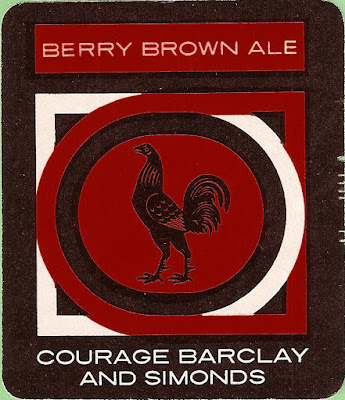It was the biggest merger of London breweries since watney, Combe and Reid combined in 1898. It was to be Courage's frist step on the road to becoming one of the UK's Big Six breweries.
"Big brewery merger in prospectI'm slightly surprised to see how simialr in size the two comapnies were. Barclay Perkins had slightly more share capital, Courage slightly more assets. But I don't think there was ever any question that it was Courage in charge. With their two breweries only a few hundred metres apart, it was inevitable that one would close. As Barclay Perkins did a few years after the merger. Except for the lager brewer, which remained open until the 1970s.
Courage and Barclay Perkins
Notes from our City staff — Friday Evening
The preliminary stages of an important brewery merger were announced today. The boards of Courage and Co. and of Barclay Perkins and Co. state that they have agreed in principle to the desirability of a merger by the formation of a holding company to acquire the share capitals of the two companies.
An independent firm of chartered accountants, Peat, Marwick, Mitchell and Co., been instructed to prepare a reort with a view to advising the respective boards as to a suitable basis for such a merger.
Issued capital of Barclay Perkins is £2,911,000 and of Courage £2,540,000. At December 31, 1953, assets of the last-named group totalled £13,417,000, and at March 31, 1954, assets of Barclay Perkins ammounted to £12,948,000. The two groups whose headquarters are in London have a large trade there and in the home counties."
Yorkshire Post and Leeds Intelligencer - Saturday 12 February 1955, page 7.
These are the details of the deal. I can't really work out which company's shareholders were getting the better deal.
"Courage-Barclay MergerSimonds of Reading was Courage's next big acquisition.
TERMS for a merger of interests of Courage and Company and Barclay, Perkins and Company, the London brewers, drawn up by Messrs. Peat. Marwick and Matchell, have been approved by both companies. They provide for the formation of a holding company which would acquire the shares of the existing companies. In exchange for the preference capital of the old companies 5% Cumulative Preference shares in the new company would be offered on this basis: For every £l00 5% Cumulative Preference stock in Courage— £l07 10s. of the new shares: for £l00 of 5% Redeemable Second Preference in Courage - £l05 in new shares: and for £l00 10% Cumulative Preference in Barclay, Perkins — £2l5 in the new shares. Ordinary shares of £1 in the holding company would be exchanged one-for-one for Barclay Perkins Ordinary shares and on a seven-for-three basis In the case of Courage Ordinary.
In effect, on last year's dividends of 22.5% for Courage and of 8% for Barclay Perkins, an Ordinary share in the new company is "buying" an ordinary dividend of 8% in the case of Barclay Perkins, but one equivalent to 9.9-14% in the case of Courage. But if that seems less than generous to Courage stockholders, it is fair to point out that their dividend was not so well covered by earnings as Barclay.
Birmingham Daily Post - Friday 27 May 1955, page 5.












































































1 comment:
I see the Barclay Perkins Brewery is now a subject of an omaze prize draw https://omaze.co.uk/pages/london-v
Post a Comment